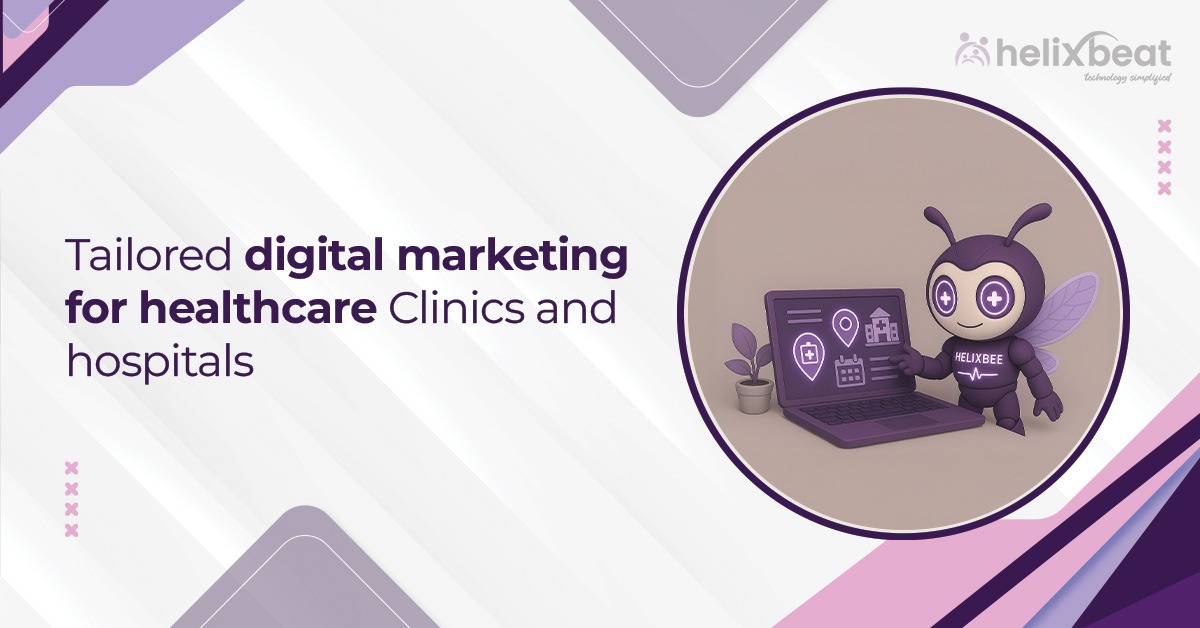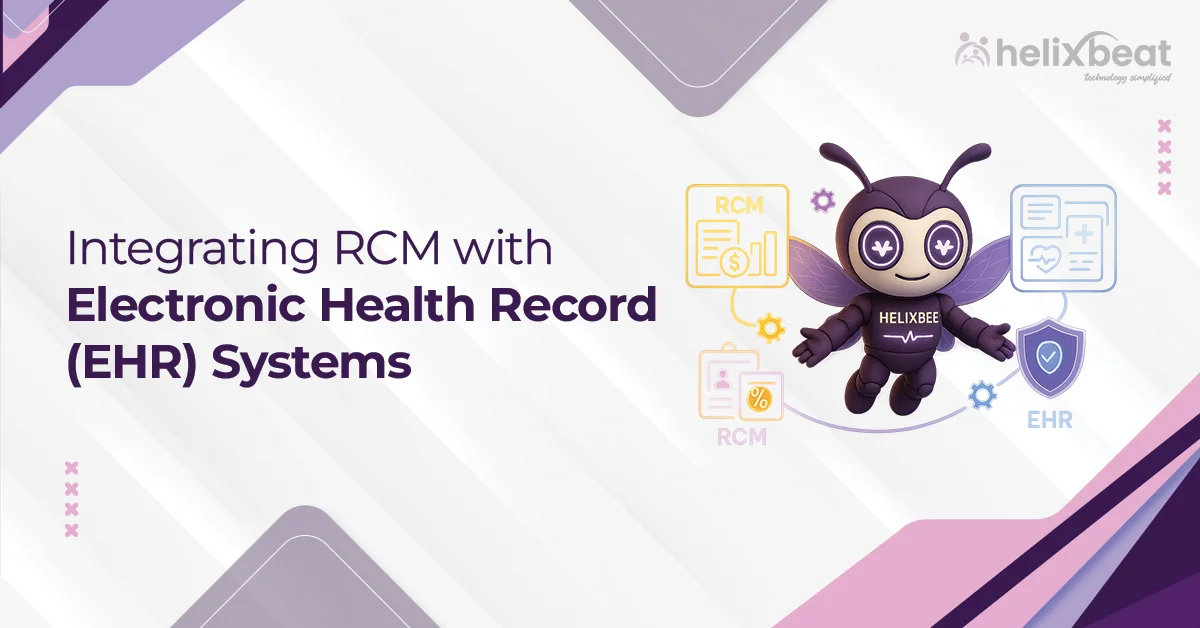Digital marketing for healthcare is a vital tool for clinics and hospitals looking to expand their patient base and enhance their visibility in a crowded digital landscape. As more patients search online for medical services, having a strong digital presence is no longer optional—it’s essential. A tailored approach to digital marketing allows healthcare providers to reach the right patients, build trust, and ultimately improve patient acquisition.
In this blog, we’ll explore why digital marketing for healthcare is crucial, how hospital digital marketing works, and the strategies you can leverage to stay ahead of your competition. From online reputation management to a comprehensive digital healthcare marketing strategy, we’ll cover everything you need to know to grow your healthcare practice in 2025 and beyond.

Table of Contents
What is Healthcare Digital Marketing?
Healthcare digital marketing concerns a variety of online strategies and tools that help healthcare providers reach their target audience, engage with potential patients, and grow their practices. This type of marketing includes:
- SEO (Search Engine Optimization): Allows your clinic or hospital to rank higher in search engines.
- Social Media Marketing: Engages patients on platforms like Facebook, Instagram, and LinkedIn.
- PPC Advertising: Drives immediate visibility through paid ads.
- Content Marketing: Provides valuable content that educates and engages your audience.
Tailored Digital Marketing for Healthcare: A Strategic Approach
Customized digital marketing within the healthcare sector involves a strategic approach that tailors marketing efforts to the distinct needs and purposes of your medical practice. Rather than relying on generic marketing strategies that often fail to resonate with potential patients, a tailored approach considers key factors such as your target demographic, the range of services you provide, and your geographical location.
This ensures the creation of a marketing strategy that engages prospective patients and encourages them to choose their practice.
Key Advantages of Customized Digital Marketing for Healthcare:
- Enhanced Targeting
- By utilizing data-driven insights, you can develop personalized advertisements and content that specifically speaks to the needs and preferences of the right patients.
- This targeted outreach helps maximize the effectiveness of your campaigns and leads to higher engagement rates.
- Improved ROI
- With a focus on strategies that are directly aligned with your specific business objectives, whether that’s increasing patient volume, promoting a particular service, or enhancing your brand presence, you can see a greater return on investment.
- Tailored marketing efforts ensure that resources are allocated efficiently, driving measurable results.
- Greater Patient Engagement
- Providing valuable and relevant content that caters to the needs and concerns of your patients fosters stronger relationships.
- By addressing common questions, offering educational resources, and nurturing a sense of community, you create a more engaged patient base that feels valued and understood.
- Helixbeat’s medical marketing services are meticulously designed to develop customized strategies that go beyond just attracting patients.
- By understanding the unique landscape of your practice and your patients, we help you establish a strong online presence that not only draws in new patients but also enhances patient loyalty and satisfaction.
6 Digital Marketing Strategies to Leverage in Healthcare
Digital marketing has become an essential resource for healthcare providers aiming to expand their practice, enhance patient acquisition, and establish a strong online presence. By utilizing a combination of tactics such as SEO, social media marketing, and management of online reputation, healthcare providers can connect with potential patients and foster trust in a digital-centric environment. Below are six digital marketing approaches that healthcare providers should consider implementing to achieve their goals:
1. Search Engine Optimization (SEO)
- SEO is among the most vital digital marketing methods for healthcare providers. By refining your website for search engines like Google, you boost your chances of appearing in search results when patients seek medical services.
- Local SEO for Doctors: A significant number of patients hunt for nearby healthcare services. Enhancing your local SEO guarantees that your practice appears in local searches, simplifying the process for nearby patients to find you.
- Content Marketing: Offering valuable materials such as blog posts, videos, and articles can address frequent patient questions and elevate your search rankings. Engaging and informative content helps establish trust and encourages patients to make appointments.
- Helixbeat’s Digital Marketing services focus on SEO strategies customized for healthcare providers, ensuring that your practice ranks higher in search results and reaches patients in need of your services.
2. Pay-Per-Click (PPC) Advertising
- While SEO yields long-term benefits, PPC advertising allows healthcare providers to gain immediate visibility, enabling them to connect with patients quickly.
- Google Ads: By bidding on relevant keywords, your practice can feature at the top of search results when potential patients are actively looking for medical services.
- Social Media Ads: Sites like Facebook and Instagram permit you to run targeted advertisements based on location, age, and interests, guaranteeing that the correct audience is exposed to your ads.
- Through Helixbeat’s Digital Marketing services, healthcare providers can efficiently manage PPC campaigns, ensuring a high return on investment and patient acquisition through paid search and social media advertisements.
3. Social Media Marketing
- Social media serves as a powerful mechanism for engaging both current and prospective patients.
- Build Trust and Authority: Sharing informative content, patient testimonials, and wellness advice can help position your practice as a reliable healthcare provider.
- Targeted Advertising: Social media platforms empower healthcare providers to execute highly targeted ads, ensuring they connect with the right audience at the right time.
4. Online Reputation Management (ORM)
- Managing your online reputation is crucial for healthcare providers, as numerous patients rely on reviews and ratings before selecting a doctor or clinic. Taking care of your practice’s online image aids in maintaining a positive reputation and attracting new patients.
- Monitoring Reviews: Outlets like Google, Yelp, and Healthgrades are the primary platforms where patients share their feedback. Engaging with both positive and negative reviews shows patients your commitment to their experience.
- Building Trust: Prompting satisfied patients to leave positive reviews helps enhance your practice’s reputation and instills confidence in new patients.
5. Content Marketing
- Content marketing enables healthcare providers to educate, inform, and engage patients while improving SEO rankings.
- By creating valuable, informative content, patients can make well-informed decisions, enhancing their overall experience with your practice.
- Blogging: Consistently publishing blog posts that tackle common health issues or recent treatments increases your website’s traffic and helps establish authority in your area.
- Video Marketing: Videos that clarify procedures or feature patient testimonials can captivate your audience and enhance trust.
- Infographics: Using infographics simplifies complex medical topics for patients, ultimately aiding in patient education.
- Helixbeat’s Digital Marketing services can assist in developing a strong content marketing strategy that boosts your practice’s credibility and drives more patients to your clinic.
6. Email Marketing
- Email marketing serves as an efficient way to keep your patients informed and engaged.
- By sending personalized emails, you can cultivate relationships with existing patients and motivate them to schedule appointments or take advantage of promotional offers.
- Newsletters: Send regular newsletters to keep your patients updated about new services, health tips, and important announcements.
- Personalized Campaigns: By tailoring emails based on patient needs, you can encourage them to book follow-up appointments or refer others to your practice.
What Are the 5 Ps of Healthcare Marketing?
The 5 Ps of healthcare marketing are essential components that form the foundation of a successful and comprehensive marketing strategy for healthcare providers. These elements help guide healthcare marketing efforts and ensure that providers are not only attracting new patients but also building long-term relationships. Here’s a breakdown of each of the 5 Ps and their role in healthcare marketing:
1. Product
- The product refers to the healthcare services or treatments you offer to your patients.
- This includes not only medical procedures but also the overall quality of care your practice provides.
- The services should be designed to meet the needs of your target audience. The more specialized your services, the more critical it is to communicate their benefits effectively.
- Whether it’s routine care, emergency services, or specialized treatments, ensuring that your healthcare offerings are clear and compelling is essential for attracting the right patients.
- Example: A clinic specializing in pediatric care must clearly define its range of services, such as vaccinations, developmental screenings, or pediatric emergency care, to attract parents seeking specialized care for their children.
2. Price
- Price refers to the cost of the services you provide. Healthcare pricing transparency is vital in today’s market, as patients are increasingly seeking clarity about the costs of treatments and services.
- Offering clear and accessible pricing options builds trust with patients. It’s also important to offer various payment options, whether it’s through insurance, financing plans, or direct payment, to accommodate patients from all financial backgrounds.
- Example: Providing an easy-to-understand breakdown of the cost of consultations, treatments, or procedures on your website helps patients make informed decisions about their care.
3. Place
- Place represents the location of your practice and how patients access your services. In today’s digital-first world, a place doesn’t just refer to your physical office; it also includes your online presence.
- A website with easy navigation, online booking, and educational resources is just as crucial as a conveniently located office.
- If your practice offers telemedicine or virtual consultations, this should be communicated as part of your service offering.
- Example: A hospital with multiple branches should ensure that each location is optimized for local SEO, allowing patients to find the closest branch when searching online effortlessly.
4. Promotion
- Promotion refers to the marketing strategies you use to attract patients to your practice.
- This includes traditional advertising, but in the digital age, it often focuses on SEO (Search Engine Optimization), PPC (Pay-Per-Click) ads, social media marketing, and content marketing.
- These tools allow healthcare providers to raise awareness, engage potential patients, and drive traffic to their websites or physical locations.
- Effective promotion strategies help you stand out in a competitive healthcare market and convey the value of your services to prospective patients.
- Example: Running a targeted PPC campaign that promotes a new service, such as a health screening, can drive immediate traffic to your site and generate appointments quickly.
5. People
- The people aspect of healthcare marketing focuses on the patient experience. Healthcare isn’t just about the services you provide; it’s also about how you interact with your patients.
- Building a positive patient experience through excellent customer service, empathy, and care helps create strong patient relationships and encourages patient loyalty.
- Word-of-mouth referrals and positive reviews are often the result of exceptional care and personal interactions.
- Example: A patient who feels heard and cared for by their doctor is more likely to return for future visits and recommend the practice to family and friends.
Choosing the Right Healthcare Digital Marketing Agency
When selecting a healthcare digital marketing agency, it’s crucial to find one that has experience with medical providers and understands the specific challenges of the industry. Here are some key factors to consider:
- Experience: Seek an agency that has a proven history in healthcare marketing.
- Comprehensive Services: Opt for an agency that provides a wide range of services, including SEO, content marketing, reputation management, and paid advertising.
- Data-Driven Approach: The agency should utilize analytics to track campaign performance and refine strategies accordingly.
- Helixbeat offers tailored healthcare digital marketing services designed to meet your objectives and deliver quantifiable results, aiding in the growth of your practice.
Conclusion
As digital marketing evolves, healthcare providers need to adopt these strategies to stay competitive and attract more patients. By utilizing approaches such as SEO, social media marketing, and online reputation management, hospitals and clinics can achieve sustainable growth and effectively acquire new patients. A customized digital marketing strategy enables healthcare organizations to connect with the right patients at the right moment, fostering trust and building enduring relationships. Ready to enhance your practice digital marketing efforts?
Schedule a demo with Helixbeat’s Digital Marketing service today and discover how we can assist in expanding your patient base and improving your online visibility.
FAQs
- What is healthcare digital marketing?
Healthcare digital marketing involves strategies like SEO, content marketing, and reputation management designed to attract patients and build a strong online presence.
- What are the 5 P’s of healthcare marketing?
The 5 P’s of healthcare marketing are Product, Price, Place, Promotion, and People, and they help guide your practice’s marketing efforts.
- What is the digital healthcare marketing strategy?
A digital healthcare marketing strategy involves integrating SEO, social media, content marketing, and reputation management to improve online visibility and attract patients.
- What are the 7 types of digital marketing?
The 7 types include SEO, PPC, social media marketing, content marketing, email marketing, online reputation management, and video marketing.
- How can digital marketing increase patients in a clinic?
By improving online visibility, engaging with patients through social media, managing reviews, and using targeted ads, digital marketing helps clinics attract more patients.
- What are the 7 P’s of marketing in the healthcare industry?
The 7 P’s include Product, Price, Place, Promotion, People, Process, and Physical Evidence, crucial for developing an effective healthcare marketing strategy.
- What is tailored digital marketing?
Tailored digital marketing involves customizing your marketing strategy to fit the specific needs, goals, and target audience of your practice.
- How can Helixbeat help in healthcare digital marketing?
Helixbeat offers customized digital marketing services that focus on increasing patient acquisition, improving online reputation, and enhancing SEO strategies for healthcare providers.
- What are the 12 types of digital marketing strategy?
These strategies include SEO, PPC, social media marketing, content marketing, email marketing, video marketing, and more, all designed to drive business growth.
- How important is content marketing for healthcare providers?
Content marketing is crucial as it helps build authority, educate patients, improve SEO rankings, and engage with your audience, leading to increased trust and patient acquisition.
- Why is local SEO important for healthcare providers?
Local SEO helps your practice appear in local search results, making it easier for patients in your area to find and contact your clinic.
- How does reputation management help healthcare providers?
Reputation management ensures that your practice maintains positive reviews and handles negative feedback effectively, which builds trust and attracts more patients.














